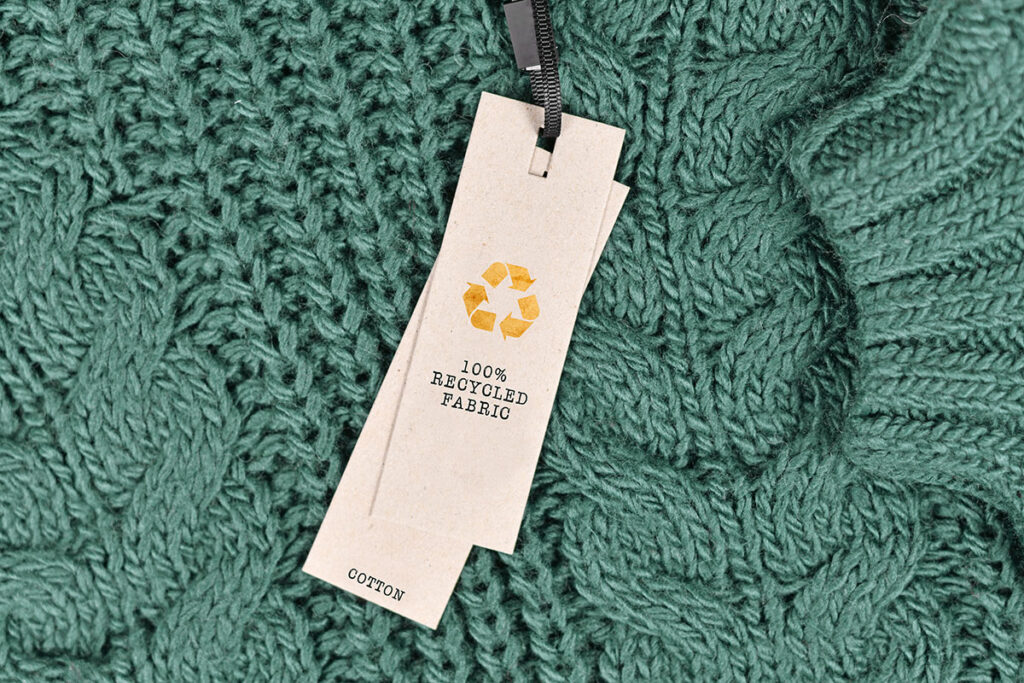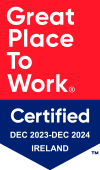How Fashion Brands are Embracing Eco-Friendly Practices
Back in 2018, when we wrote about the emergence of Sustainable Fashion, little did we think that five years later, the demand for sustainably produced clothing would be such that it would have spawned a thriving, multi-faceted, multi-million dollar global industry.

In its infancy, Sustainable Fashion pretty much consisted of plain cotton tee shirts, over-priced linen lines and the odd hemp dress. Unless you could afford the cool, clean tailoring and faux leather handbags crafted by designers like Stella Mc Cartney and Katherine Hammett, the chances were your ethical wardrobe comprised a few tie dye tee shirt dresses, a couple of wool jumpers and a pair of wooden clogs.
Fast forward five years and there’s nothing fast or frumpy about the plethora of clean fashion choices available to an ever-growing market. Such is the demand for ethical clothing that the sustainable fashion industry has spread its wings, expanding out into areas like subscription services, evening wear rental and the pre-loved market.
Once the realm of a future-facing, well-heeled few, sustainable fashion has met the high street, with household names such as Zara and Toms now leading the Gen Alpha charge.
And as people become more aware of the disastrous impact the traditional fashion industry has had on the environment, they are starting to turn away from fast fashion – the allure of which has always been low price, quick turnaround – to value-for-money, sustainably-produced quality clothing which aligns with our newly honed green sensibilities.

ISO 9001 driving Quality Product
When it comes to Sustainable Fashion, quality is key, so it stands to reason that many of the medium to large fashion houses have bought into the tenets of ISO standards such as ISO 9001 and ISO 14001.
The global benchmark for product and service excellence, the best-in-practice ISO Quality Management System Standard has played a central part in shoring up the fashion industry’s evolution from cheap mock-ups of runway samples to made-to-last, value-driven clothes made using renewable materials such as recycled, reinvented cloth, natural dyes and high-tech man-made fabrics such as Tencel, repurposed wool and innovative fibres such as Econyl.
In addition to helping brands in market creation and penetration through enhanced reputation gained via a publicly demonstrated commitment to producing quality product, ISO 9001 can help ensure businesses achieve not just regulatory compliance but also effective control over and management of factors such as raw materials which in turn positively impacts the end product.
60% of M&S consumers said they are making more effort to educate themselves about their environmental impact
In our 21st century eco-conscious world, market stalwarts such as M&S, Gucci and Louis Vuitton (LMVH Group) are multi ISO standard certified, their combined credentials including ISO 9001, ISO 14001 and ISO 45001 amongst others. In adopting ISO best practices, these iconic fashion brands have been enabled to develop a structured approach to sustainability in line and compliance with international best practice standards and regulations.
In fact, British retail giant M&S is so committed to achieving Net Zero by 2040 that it completely reset its carbon neutral Plan A last year, with new milestones such as Zero Waste to Landfill and Driving a Circular Economy being added into an already challenging sustainability programme.
As part of its commitment to the multi-million pound Revolving Credit Facility, M&S has launched a multi-strand fashion offensive that has seen them roll out initiatives including the Sustainable Denim Range, a Tencel-based Good Move range and the launch of its re-use/recycle Shwopping Programme aimed at shoring up the ever-expanding Circular Economy and enabling their customer base to live a “lower-carbon lifestyle”. For example, the latter allows customers to buy clothes that are “new” to them without contributing to fashion landfill and making minimal environmental impact.
Another business aspect championed by the likes of M&S and LMVH, one which has made serious traction across the industry as a whole, is that of transparency in how materials for clothing and accessories lines are responsibly sourced.
Fashion brands now feel they need to be seen to have open and transparent supply chains where shared eco-objectives and a culture of continuous improvement are at the heart of the business alliances. Retail and Manufacturing businesses across the fashion industry are taking steps to develop sourcing principles based on quality and environmental standards aligned with the pre-requisites of globally recognised frameworks such as ISO 9001 and ISO 14001.
Fashion Brands are Committed to Continuous Improvement
From streaming production processes for everything down to button inventory and rolling out CO2 compensation projects, as seen at Louis Vuitton which, according to its 2019 Environmental Responsibility Report, had reduced its energy consumption by 29%, fashion brands have begun to clearly demonstrate a commitment to continuous improvement, quality product and customer service excellence whilst simultaneously working to target-driven, eco-milestones by way of initiatives such as carbon offsetting and 100% responsibly sourced raw materials (a key objective of Gucci’s Production System Sustainability Strategy which the company aims to achieve by 2025.)
Working to the stringent requirements of both ISO 14001 and ISO 50001, fashion businesses like Gucci and high street giant Zara (under the Inditex moniker) have put the Sustainable Environmental Management of their production and logistics facilities front and centre of their sustainability programmes.
Closer to home, Irish fashion retailer Primark – leader of fast fashion for decades – has long been working towards environmental sustainability, onboarding eco-friendly initiatives such as responsible sourcing, chemicals and pollution management, enhanced resource and waste management and monitoring and managing energy and greenhouse gas emissions.
In 2018, the retail colossus launched its Sustainable Cotton Programme, committing it to a more environmentally focussed supply chain in line with its implementation of an ISO 140001 Environmental Management System.
Many fashion industry leaders like Primark have developed policies that reflect their position on areas such as ethical trade and environmental sustainability. To deliver on these policies, they have implemented ISO-based frameworks to shore up best practices across the entire supply chain to conform to ISO quality, energy and environmental requirements.
For example, to achieve their Net Zero targets, fashion brands are utilising environmental management systems such as ISO 14001 to design environmental sustainability guidance, global sourcing and Look Behind the Label programmes in line with the Sustainable Clothing Action Plan and European Clothing Action Plan. Based on ISO environmental best practices, these programmes ensure a transparent and traceable supply chain within which all stakeholders are aware of the standards required of them to achieve continuous eco-friendly improvement.
Implementing ISO Quality, Energy and Environmental Management Systems has enabled companies such as Zara and Primark to perform data-driven, risk-oriented and process-based audits and reviews ensuring they achieve not just sustainability targets but also continuous improvement across operations as well as the entire organisation and its external stakeholders.
What does supply chain transparency mean to the Fashion Industry?
Simply put, full supply chain disclosure, meaning any fashion business wanting to demonstrate a commitment to Net Zero must publicly disclose all details of their supply chain – traceability, sustainability & ESG performance – from sourcing materials (including occupational health and safety and labour) through transportation to waste management (impacting fashion landfill and carbon footprint).
As the number of countries introducing stringent regulations prohibiting entry into their markets grows, it has become incumbent upon exporters and manufacturers within the fashion industry to demonstrably prove compliance with these new labour and environmental laws. Furthermore, legislation is pending across several key importers that will require chain-of-custody reporting and supply chain mapping, with companies which fail to comply facing penalties if not outright market exclusion.
Management Systems such as those developed by ISO, enable manufacturers and producers within fashion to achieve optimal control and visibility of data, outputs, resources and sources across the farm-floor-rail lifecycle of their product. With customers continuing to drive transparency and ESG compliance within the fashion industry, more and more businesses are opting to leverage process-driven ISO management systems to manage everything from ESG data to resource performance.
ISO Management Systems offer Tangible Results
Marks & Spencer
Reduction in Cardboard & Plastic Waste by 26%
Reduction in CO2 Emissions by 27%
Zara
Ethically Sourced Organic Cotton (incl recycled) 61% of 2022 items sold
Garments Collected via Garment Collection Programme 17,000
Supply Chain Audits in 2022 23,000
Global Energy Consumption (from 7.1m GJ in 2018) 6.1m GJ
Primark
Energy Consumption Reduction (Uk&I) – 37%
Fast-tracking of Elimination of Non-Clothing Wasted to 2027
Clothes made using recycled fibres – 35%
ISO standards are supporting the fashion industry to meet consumer demands for clothing and accessories made using ethically sourced, organic materials delivered through a variety of channels including new, repurposed or pre-loved.
In addition to leveraging standards like ISO 9001 and 14001 to help them deliver quality sustainably produced product via a traceable supply chain, in being compliant with the requirements of these standards, fashion businesses are increasing their chances of:
- Becoming net zero businesses across the value chain
- Achieving ethical trade and human rights across all aspects of the business – internal and external
- Ethical sourcing and transparent reporting on supply chain practices
- Gaining organisation-wide buy in and engagement with policy and standards compliance (across all aspects of the business including product safety, environmental pollution prevention and supplier compliance)
In 2023, more and more businesses within the fashion industry are making environmental sustainability central to the development of their consumer products. To achieve this, they are implementing and continuously improving ISO management systems that engage all aspects of their operations from industry collaboration through ethical trading awareness training to zero discharge of hazardous waste. Within an industry that is constantly moving with ever-changing trends, it is incumbent upon all stakeholders, from farmers to buyers to initiate and support collaborative efforts to drive quality and environmental improvements.
CG Business Consulting ISO Services
If your organisation is considering introducing, increasing or expediting Quality or Sustainability targets, CG Business Consulting can help achieve those goals by performing ISO-based reviews such as Carbon Foot-printing, Energy Audits and Gap Analyses.
To have a no-strings chat with one of our team of Quality or Sustainability Consultants, contact us on 01 – 620 4121 today.
Guide to Energy Audits

This resource will guide you through the process of an Energy Audit so you know what to expect.
An Energy Audit is often the first step to a more sustainable future for your business.


